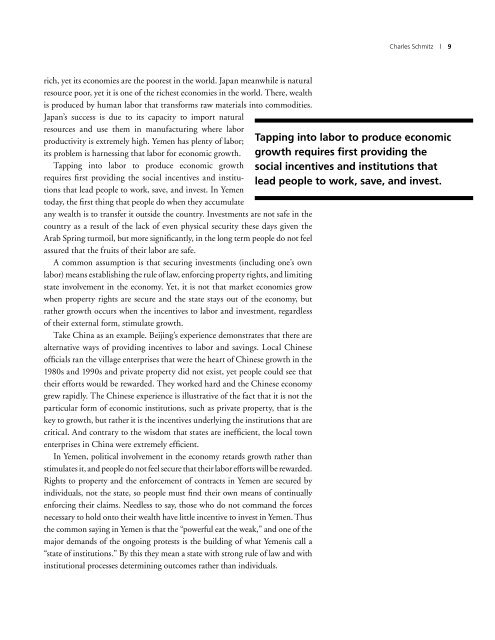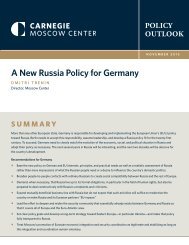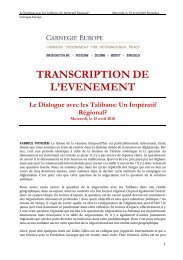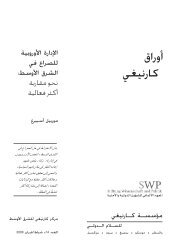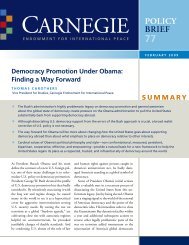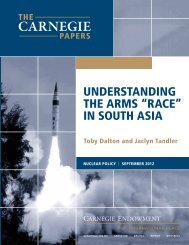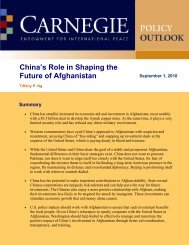building a better yemen - Carnegie Endowment for International Peace
building a better yemen - Carnegie Endowment for International Peace
building a better yemen - Carnegie Endowment for International Peace
Create successful ePaper yourself
Turn your PDF publications into a flip-book with our unique Google optimized e-Paper software.
Charles Schmitz | 9<br />
rich, yet its economies are the poorest in the world. Japan meanwhile is natural<br />
resource poor, yet it is one of the richest economies in the world. There, wealth<br />
is produced by human labor that trans<strong>for</strong>ms raw materials into commodities.<br />
Japan’s success is due to its capacity to import natural<br />
resources and use them in manufacturing where labor<br />
productivity is extremely high. Yemen has plenty of labor; Tapping into labor to produce economic<br />
its problem is harnessing that labor <strong>for</strong> economic growth. growth requires first providing the<br />
Tapping into labor to produce economic growth social incentives and institutions that<br />
requires first providing the social incentives and institu- lead people to work, save, and invest.<br />
tions that lead people to work, save, and invest. In Yemen<br />
today, the first thing that people do when they accumulate<br />
any wealth is to transfer it outside the country. Investments are not safe in the<br />
country as a result of the lack of even physical security these days given the<br />
Arab Spring turmoil, but more significantly, in the long term people do not feel<br />
assured that the fruits of their labor are safe.<br />
A common assumption is that securing investments (including one’s own<br />
labor) means establishing the rule of law, en<strong>for</strong>cing property rights, and limiting<br />
state involvement in the economy. Yet, it is not that market economies grow<br />
when property rights are secure and the state stays out of the economy, but<br />
rather growth occurs when the incentives to labor and investment, regardless<br />
of their external <strong>for</strong>m, stimulate growth.<br />
Take China as an example. Beijing’s experience demonstrates that there are<br />
alternative ways of providing incentives to labor and savings. Local Chinese<br />
officials ran the village enterprises that were the heart of Chinese growth in the<br />
1980s and 1990s and private property did not exist, yet people could see that<br />
their ef<strong>for</strong>ts would be rewarded. They worked hard and the Chinese economy<br />
grew rapidly. The Chinese experience is illustrative of the fact that it is not the<br />
particular <strong>for</strong>m of economic institutions, such as private property, that is the<br />
key to growth, but rather it is the incentives underlying the institutions that are<br />
critical. And contrary to the wisdom that states are inefficient, the local town<br />
enterprises in China were extremely efficient.<br />
In Yemen, political involvement in the economy retards growth rather than<br />
stimulates it, and people do not feel secure that their labor ef<strong>for</strong>ts will be rewarded.<br />
Rights to property and the en<strong>for</strong>cement of contracts in Yemen are secured by<br />
individuals, not the state, so people must find their own means of continually<br />
en<strong>for</strong>cing their claims. Needless to say, those who do not command the <strong>for</strong>ces<br />
necessary to hold onto their wealth have little incentive to invest in Yemen. Thus<br />
the common saying in Yemen is that the “powerful eat the weak,” and one of the<br />
major demands of the ongoing protests is the <strong>building</strong> of what Yemenis call a<br />
“state of institutions.” By this they mean a state with strong rule of law and with<br />
institutional processes determining outcomes rather than individuals.


